Organization Behavior: Leadership Analysis of Mark Zuckerberg Essay
VerifiedAdded on 2022/10/17
|8
|2135
|405
Essay
AI Summary
This essay delves into the leadership style of Mark Zuckerberg, co-founder of Facebook, focusing on his transformational approach and its impact on organizational behavior. It examines Zuckerberg's vision, his ability to connect people globally, and his proactive stance in decision-making. The essay highlights the challenges he faced, including securing funding in the early stages and navigating privacy concerns as Facebook grew. It analyzes his use of autocratic, democratic, and laissez-faire leadership styles, emphasizing his commitment to innovation and transparency. The paper also provides suggestions for enhancing his leadership effectiveness by fostering a cohesive team and promoting innovation. The essay concludes by emphasizing the importance of Zuckerberg's critical thinking and transparency in the workplace, serving as an inspiration for aspiring leaders. References are included to support the analysis.
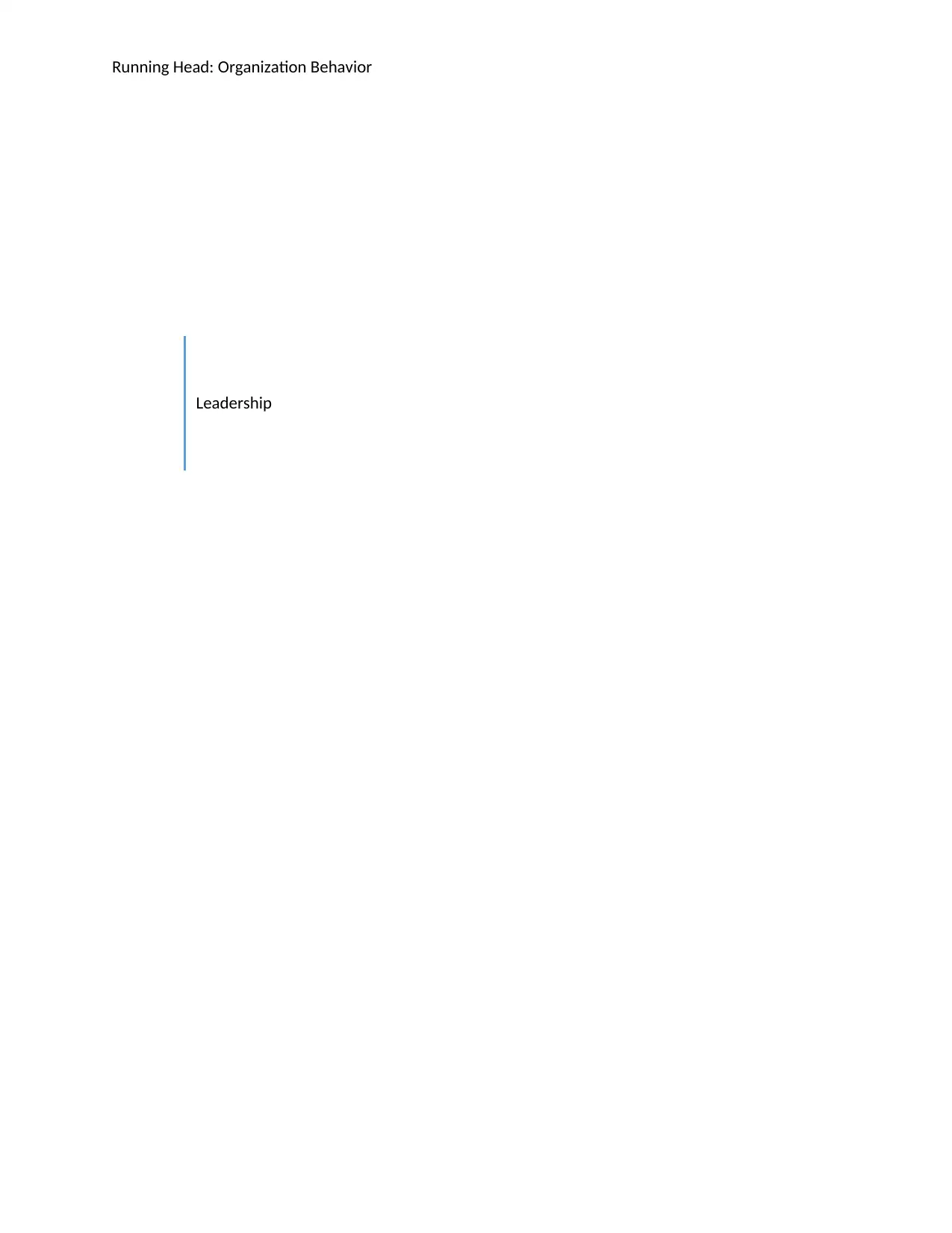
Running Head: Organization Behavior
Leadership
Leadership
Paraphrase This Document
Need a fresh take? Get an instant paraphrase of this document with our AI Paraphraser
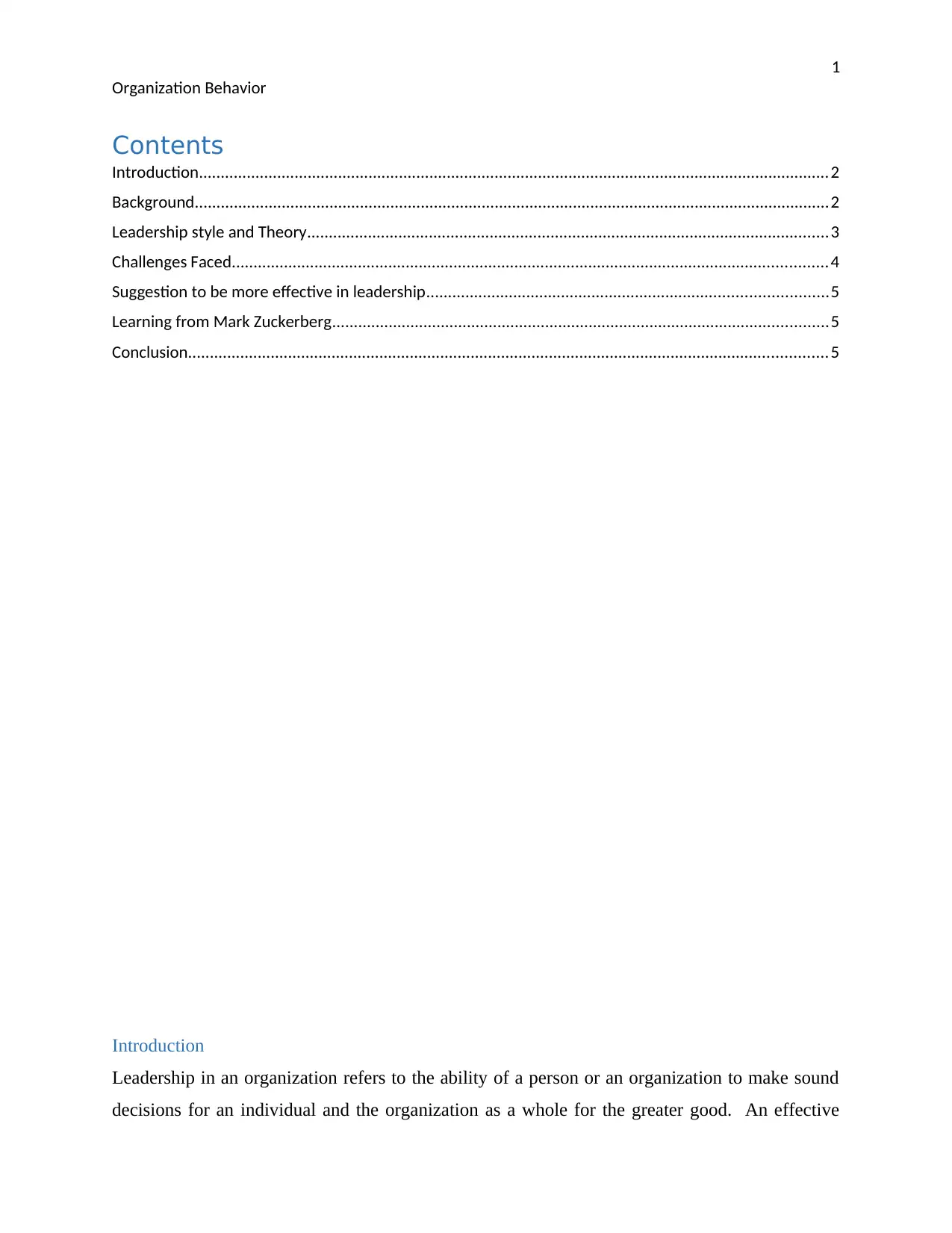
1
Organization Behavior
Contents
Introduction.................................................................................................................................................2
Background..................................................................................................................................................2
Leadership style and Theory........................................................................................................................3
Challenges Faced.........................................................................................................................................4
Suggestion to be more effective in leadership............................................................................................5
Learning from Mark Zuckerberg..................................................................................................................5
Conclusion...................................................................................................................................................5
Introduction
Leadership in an organization refers to the ability of a person or an organization to make sound
decisions for an individual and the organization as a whole for the greater good. An effective
Organization Behavior
Contents
Introduction.................................................................................................................................................2
Background..................................................................................................................................................2
Leadership style and Theory........................................................................................................................3
Challenges Faced.........................................................................................................................................4
Suggestion to be more effective in leadership............................................................................................5
Learning from Mark Zuckerberg..................................................................................................................5
Conclusion...................................................................................................................................................5
Introduction
Leadership in an organization refers to the ability of a person or an organization to make sound
decisions for an individual and the organization as a whole for the greater good. An effective
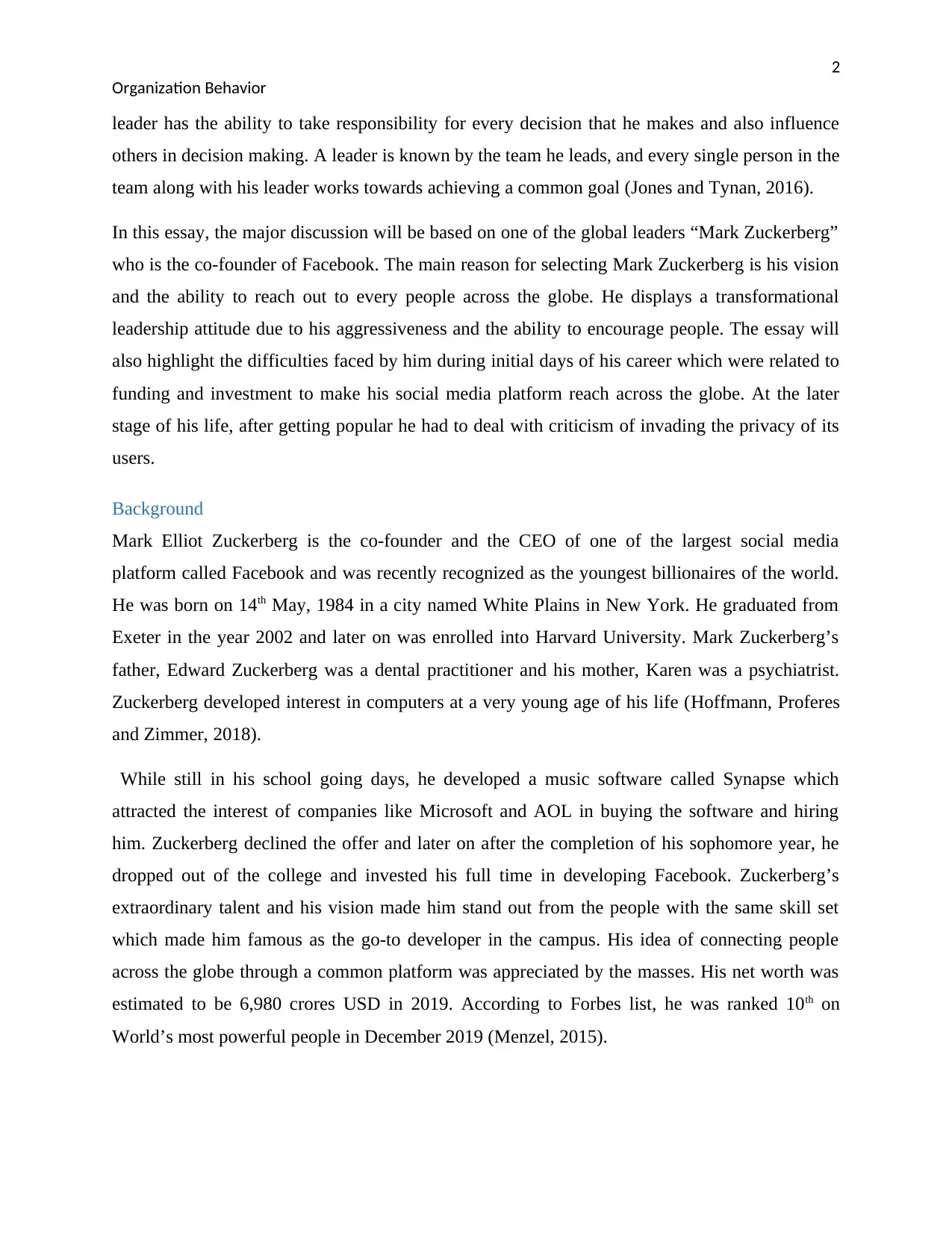
2
Organization Behavior
leader has the ability to take responsibility for every decision that he makes and also influence
others in decision making. A leader is known by the team he leads, and every single person in the
team along with his leader works towards achieving a common goal (Jones and Tynan, 2016).
In this essay, the major discussion will be based on one of the global leaders “Mark Zuckerberg”
who is the co-founder of Facebook. The main reason for selecting Mark Zuckerberg is his vision
and the ability to reach out to every people across the globe. He displays a transformational
leadership attitude due to his aggressiveness and the ability to encourage people. The essay will
also highlight the difficulties faced by him during initial days of his career which were related to
funding and investment to make his social media platform reach across the globe. At the later
stage of his life, after getting popular he had to deal with criticism of invading the privacy of its
users.
Background
Mark Elliot Zuckerberg is the co-founder and the CEO of one of the largest social media
platform called Facebook and was recently recognized as the youngest billionaires of the world.
He was born on 14th May, 1984 in a city named White Plains in New York. He graduated from
Exeter in the year 2002 and later on was enrolled into Harvard University. Mark Zuckerberg’s
father, Edward Zuckerberg was a dental practitioner and his mother, Karen was a psychiatrist.
Zuckerberg developed interest in computers at a very young age of his life (Hoffmann, Proferes
and Zimmer, 2018).
While still in his school going days, he developed a music software called Synapse which
attracted the interest of companies like Microsoft and AOL in buying the software and hiring
him. Zuckerberg declined the offer and later on after the completion of his sophomore year, he
dropped out of the college and invested his full time in developing Facebook. Zuckerberg’s
extraordinary talent and his vision made him stand out from the people with the same skill set
which made him famous as the go-to developer in the campus. His idea of connecting people
across the globe through a common platform was appreciated by the masses. His net worth was
estimated to be 6,980 crores USD in 2019. According to Forbes list, he was ranked 10th on
World’s most powerful people in December 2019 (Menzel, 2015).
Organization Behavior
leader has the ability to take responsibility for every decision that he makes and also influence
others in decision making. A leader is known by the team he leads, and every single person in the
team along with his leader works towards achieving a common goal (Jones and Tynan, 2016).
In this essay, the major discussion will be based on one of the global leaders “Mark Zuckerberg”
who is the co-founder of Facebook. The main reason for selecting Mark Zuckerberg is his vision
and the ability to reach out to every people across the globe. He displays a transformational
leadership attitude due to his aggressiveness and the ability to encourage people. The essay will
also highlight the difficulties faced by him during initial days of his career which were related to
funding and investment to make his social media platform reach across the globe. At the later
stage of his life, after getting popular he had to deal with criticism of invading the privacy of its
users.
Background
Mark Elliot Zuckerberg is the co-founder and the CEO of one of the largest social media
platform called Facebook and was recently recognized as the youngest billionaires of the world.
He was born on 14th May, 1984 in a city named White Plains in New York. He graduated from
Exeter in the year 2002 and later on was enrolled into Harvard University. Mark Zuckerberg’s
father, Edward Zuckerberg was a dental practitioner and his mother, Karen was a psychiatrist.
Zuckerberg developed interest in computers at a very young age of his life (Hoffmann, Proferes
and Zimmer, 2018).
While still in his school going days, he developed a music software called Synapse which
attracted the interest of companies like Microsoft and AOL in buying the software and hiring
him. Zuckerberg declined the offer and later on after the completion of his sophomore year, he
dropped out of the college and invested his full time in developing Facebook. Zuckerberg’s
extraordinary talent and his vision made him stand out from the people with the same skill set
which made him famous as the go-to developer in the campus. His idea of connecting people
across the globe through a common platform was appreciated by the masses. His net worth was
estimated to be 6,980 crores USD in 2019. According to Forbes list, he was ranked 10th on
World’s most powerful people in December 2019 (Menzel, 2015).
⊘ This is a preview!⊘
Do you want full access?
Subscribe today to unlock all pages.

Trusted by 1+ million students worldwide
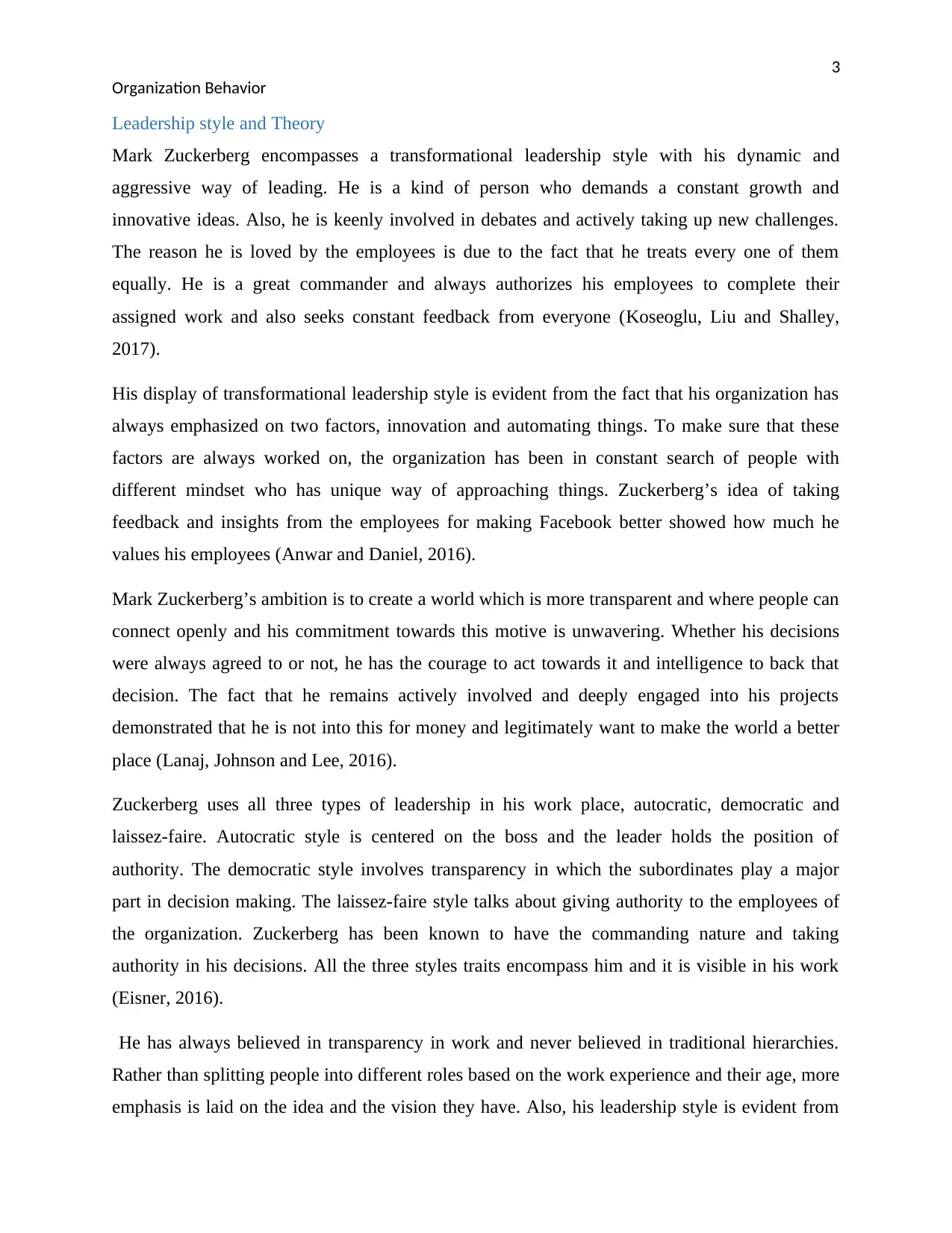
3
Organization Behavior
Leadership style and Theory
Mark Zuckerberg encompasses a transformational leadership style with his dynamic and
aggressive way of leading. He is a kind of person who demands a constant growth and
innovative ideas. Also, he is keenly involved in debates and actively taking up new challenges.
The reason he is loved by the employees is due to the fact that he treats every one of them
equally. He is a great commander and always authorizes his employees to complete their
assigned work and also seeks constant feedback from everyone (Koseoglu, Liu and Shalley,
2017).
His display of transformational leadership style is evident from the fact that his organization has
always emphasized on two factors, innovation and automating things. To make sure that these
factors are always worked on, the organization has been in constant search of people with
different mindset who has unique way of approaching things. Zuckerberg’s idea of taking
feedback and insights from the employees for making Facebook better showed how much he
values his employees (Anwar and Daniel, 2016).
Mark Zuckerberg’s ambition is to create a world which is more transparent and where people can
connect openly and his commitment towards this motive is unwavering. Whether his decisions
were always agreed to or not, he has the courage to act towards it and intelligence to back that
decision. The fact that he remains actively involved and deeply engaged into his projects
demonstrated that he is not into this for money and legitimately want to make the world a better
place (Lanaj, Johnson and Lee, 2016).
Zuckerberg uses all three types of leadership in his work place, autocratic, democratic and
laissez-faire. Autocratic style is centered on the boss and the leader holds the position of
authority. The democratic style involves transparency in which the subordinates play a major
part in decision making. The laissez-faire style talks about giving authority to the employees of
the organization. Zuckerberg has been known to have the commanding nature and taking
authority in his decisions. All the three styles traits encompass him and it is visible in his work
(Eisner, 2016).
He has always believed in transparency in work and never believed in traditional hierarchies.
Rather than splitting people into different roles based on the work experience and their age, more
emphasis is laid on the idea and the vision they have. Also, his leadership style is evident from
Organization Behavior
Leadership style and Theory
Mark Zuckerberg encompasses a transformational leadership style with his dynamic and
aggressive way of leading. He is a kind of person who demands a constant growth and
innovative ideas. Also, he is keenly involved in debates and actively taking up new challenges.
The reason he is loved by the employees is due to the fact that he treats every one of them
equally. He is a great commander and always authorizes his employees to complete their
assigned work and also seeks constant feedback from everyone (Koseoglu, Liu and Shalley,
2017).
His display of transformational leadership style is evident from the fact that his organization has
always emphasized on two factors, innovation and automating things. To make sure that these
factors are always worked on, the organization has been in constant search of people with
different mindset who has unique way of approaching things. Zuckerberg’s idea of taking
feedback and insights from the employees for making Facebook better showed how much he
values his employees (Anwar and Daniel, 2016).
Mark Zuckerberg’s ambition is to create a world which is more transparent and where people can
connect openly and his commitment towards this motive is unwavering. Whether his decisions
were always agreed to or not, he has the courage to act towards it and intelligence to back that
decision. The fact that he remains actively involved and deeply engaged into his projects
demonstrated that he is not into this for money and legitimately want to make the world a better
place (Lanaj, Johnson and Lee, 2016).
Zuckerberg uses all three types of leadership in his work place, autocratic, democratic and
laissez-faire. Autocratic style is centered on the boss and the leader holds the position of
authority. The democratic style involves transparency in which the subordinates play a major
part in decision making. The laissez-faire style talks about giving authority to the employees of
the organization. Zuckerberg has been known to have the commanding nature and taking
authority in his decisions. All the three styles traits encompass him and it is visible in his work
(Eisner, 2016).
He has always believed in transparency in work and never believed in traditional hierarchies.
Rather than splitting people into different roles based on the work experience and their age, more
emphasis is laid on the idea and the vision they have. Also, his leadership style is evident from
Paraphrase This Document
Need a fresh take? Get an instant paraphrase of this document with our AI Paraphraser
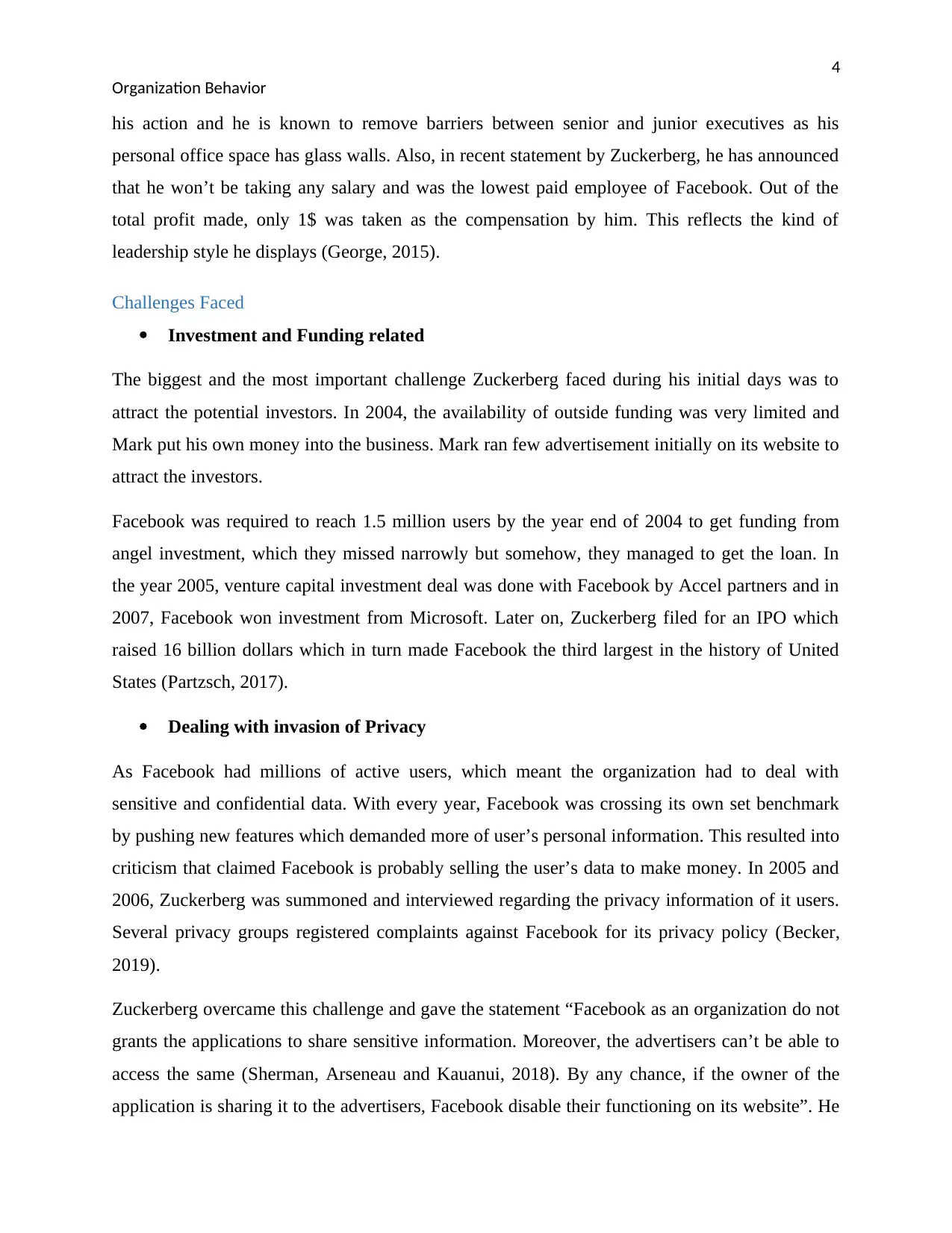
4
Organization Behavior
his action and he is known to remove barriers between senior and junior executives as his
personal office space has glass walls. Also, in recent statement by Zuckerberg, he has announced
that he won’t be taking any salary and was the lowest paid employee of Facebook. Out of the
total profit made, only 1$ was taken as the compensation by him. This reflects the kind of
leadership style he displays (George, 2015).
Challenges Faced
Investment and Funding related
The biggest and the most important challenge Zuckerberg faced during his initial days was to
attract the potential investors. In 2004, the availability of outside funding was very limited and
Mark put his own money into the business. Mark ran few advertisement initially on its website to
attract the investors.
Facebook was required to reach 1.5 million users by the year end of 2004 to get funding from
angel investment, which they missed narrowly but somehow, they managed to get the loan. In
the year 2005, venture capital investment deal was done with Facebook by Accel partners and in
2007, Facebook won investment from Microsoft. Later on, Zuckerberg filed for an IPO which
raised 16 billion dollars which in turn made Facebook the third largest in the history of United
States (Partzsch, 2017).
Dealing with invasion of Privacy
As Facebook had millions of active users, which meant the organization had to deal with
sensitive and confidential data. With every year, Facebook was crossing its own set benchmark
by pushing new features which demanded more of user’s personal information. This resulted into
criticism that claimed Facebook is probably selling the user’s data to make money. In 2005 and
2006, Zuckerberg was summoned and interviewed regarding the privacy information of it users.
Several privacy groups registered complaints against Facebook for its privacy policy (Becker,
2019).
Zuckerberg overcame this challenge and gave the statement “Facebook as an organization do not
grants the applications to share sensitive information. Moreover, the advertisers can’t be able to
access the same (Sherman, Arseneau and Kauanui, 2018). By any chance, if the owner of the
application is sharing it to the advertisers, Facebook disable their functioning on its website”. He
Organization Behavior
his action and he is known to remove barriers between senior and junior executives as his
personal office space has glass walls. Also, in recent statement by Zuckerberg, he has announced
that he won’t be taking any salary and was the lowest paid employee of Facebook. Out of the
total profit made, only 1$ was taken as the compensation by him. This reflects the kind of
leadership style he displays (George, 2015).
Challenges Faced
Investment and Funding related
The biggest and the most important challenge Zuckerberg faced during his initial days was to
attract the potential investors. In 2004, the availability of outside funding was very limited and
Mark put his own money into the business. Mark ran few advertisement initially on its website to
attract the investors.
Facebook was required to reach 1.5 million users by the year end of 2004 to get funding from
angel investment, which they missed narrowly but somehow, they managed to get the loan. In
the year 2005, venture capital investment deal was done with Facebook by Accel partners and in
2007, Facebook won investment from Microsoft. Later on, Zuckerberg filed for an IPO which
raised 16 billion dollars which in turn made Facebook the third largest in the history of United
States (Partzsch, 2017).
Dealing with invasion of Privacy
As Facebook had millions of active users, which meant the organization had to deal with
sensitive and confidential data. With every year, Facebook was crossing its own set benchmark
by pushing new features which demanded more of user’s personal information. This resulted into
criticism that claimed Facebook is probably selling the user’s data to make money. In 2005 and
2006, Zuckerberg was summoned and interviewed regarding the privacy information of it users.
Several privacy groups registered complaints against Facebook for its privacy policy (Becker,
2019).
Zuckerberg overcame this challenge and gave the statement “Facebook as an organization do not
grants the applications to share sensitive information. Moreover, the advertisers can’t be able to
access the same (Sherman, Arseneau and Kauanui, 2018). By any chance, if the owner of the
application is sharing it to the advertisers, Facebook disable their functioning on its website”. He
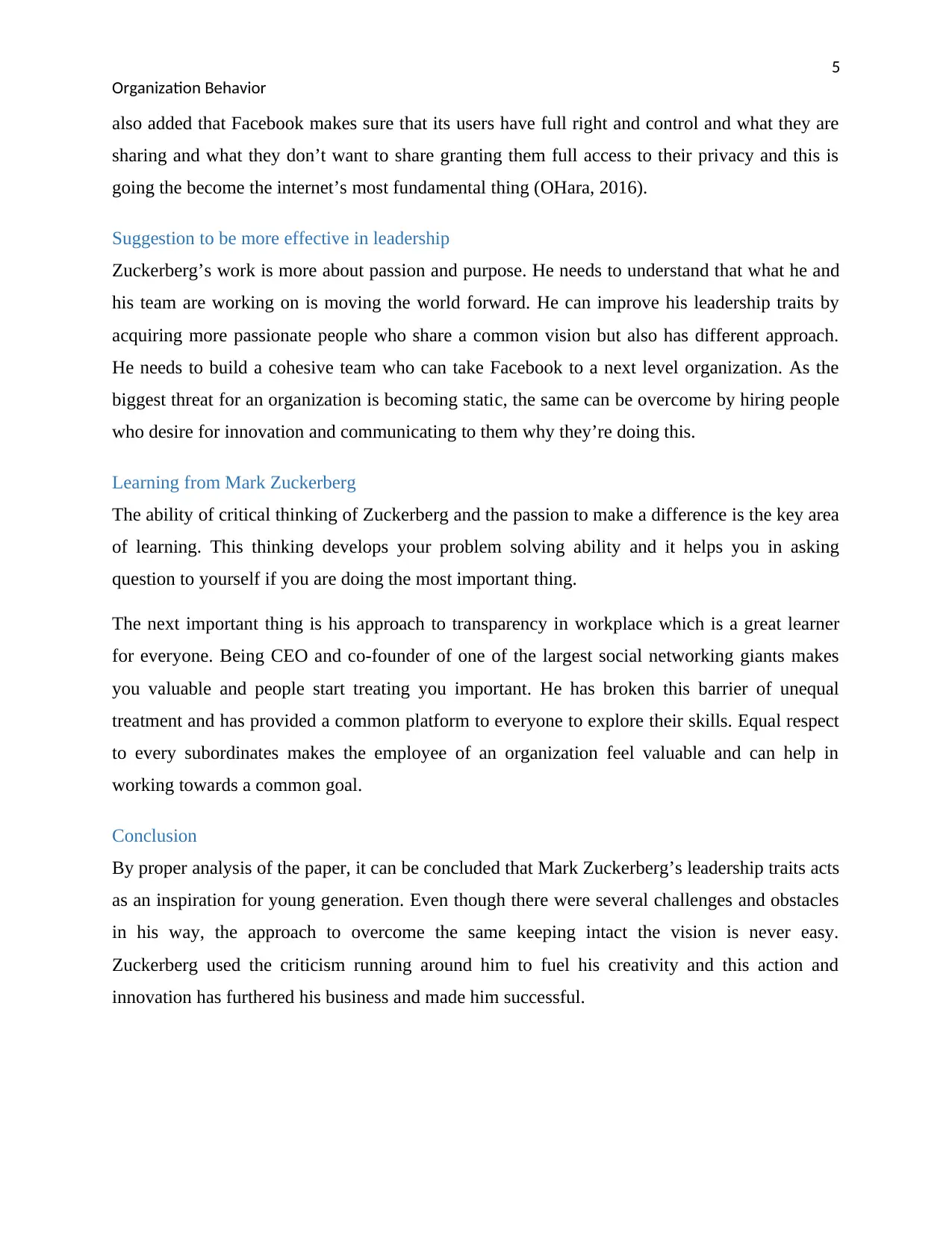
5
Organization Behavior
also added that Facebook makes sure that its users have full right and control and what they are
sharing and what they don’t want to share granting them full access to their privacy and this is
going the become the internet’s most fundamental thing (OHara, 2016).
Suggestion to be more effective in leadership
Zuckerberg’s work is more about passion and purpose. He needs to understand that what he and
his team are working on is moving the world forward. He can improve his leadership traits by
acquiring more passionate people who share a common vision but also has different approach.
He needs to build a cohesive team who can take Facebook to a next level organization. As the
biggest threat for an organization is becoming static, the same can be overcome by hiring people
who desire for innovation and communicating to them why they’re doing this.
Learning from Mark Zuckerberg
The ability of critical thinking of Zuckerberg and the passion to make a difference is the key area
of learning. This thinking develops your problem solving ability and it helps you in asking
question to yourself if you are doing the most important thing.
The next important thing is his approach to transparency in workplace which is a great learner
for everyone. Being CEO and co-founder of one of the largest social networking giants makes
you valuable and people start treating you important. He has broken this barrier of unequal
treatment and has provided a common platform to everyone to explore their skills. Equal respect
to every subordinates makes the employee of an organization feel valuable and can help in
working towards a common goal.
Conclusion
By proper analysis of the paper, it can be concluded that Mark Zuckerberg’s leadership traits acts
as an inspiration for young generation. Even though there were several challenges and obstacles
in his way, the approach to overcome the same keeping intact the vision is never easy.
Zuckerberg used the criticism running around him to fuel his creativity and this action and
innovation has furthered his business and made him successful.
Organization Behavior
also added that Facebook makes sure that its users have full right and control and what they are
sharing and what they don’t want to share granting them full access to their privacy and this is
going the become the internet’s most fundamental thing (OHara, 2016).
Suggestion to be more effective in leadership
Zuckerberg’s work is more about passion and purpose. He needs to understand that what he and
his team are working on is moving the world forward. He can improve his leadership traits by
acquiring more passionate people who share a common vision but also has different approach.
He needs to build a cohesive team who can take Facebook to a next level organization. As the
biggest threat for an organization is becoming static, the same can be overcome by hiring people
who desire for innovation and communicating to them why they’re doing this.
Learning from Mark Zuckerberg
The ability of critical thinking of Zuckerberg and the passion to make a difference is the key area
of learning. This thinking develops your problem solving ability and it helps you in asking
question to yourself if you are doing the most important thing.
The next important thing is his approach to transparency in workplace which is a great learner
for everyone. Being CEO and co-founder of one of the largest social networking giants makes
you valuable and people start treating you important. He has broken this barrier of unequal
treatment and has provided a common platform to everyone to explore their skills. Equal respect
to every subordinates makes the employee of an organization feel valuable and can help in
working towards a common goal.
Conclusion
By proper analysis of the paper, it can be concluded that Mark Zuckerberg’s leadership traits acts
as an inspiration for young generation. Even though there were several challenges and obstacles
in his way, the approach to overcome the same keeping intact the vision is never easy.
Zuckerberg used the criticism running around him to fuel his creativity and this action and
innovation has furthered his business and made him successful.
⊘ This is a preview!⊘
Do you want full access?
Subscribe today to unlock all pages.

Trusted by 1+ million students worldwide
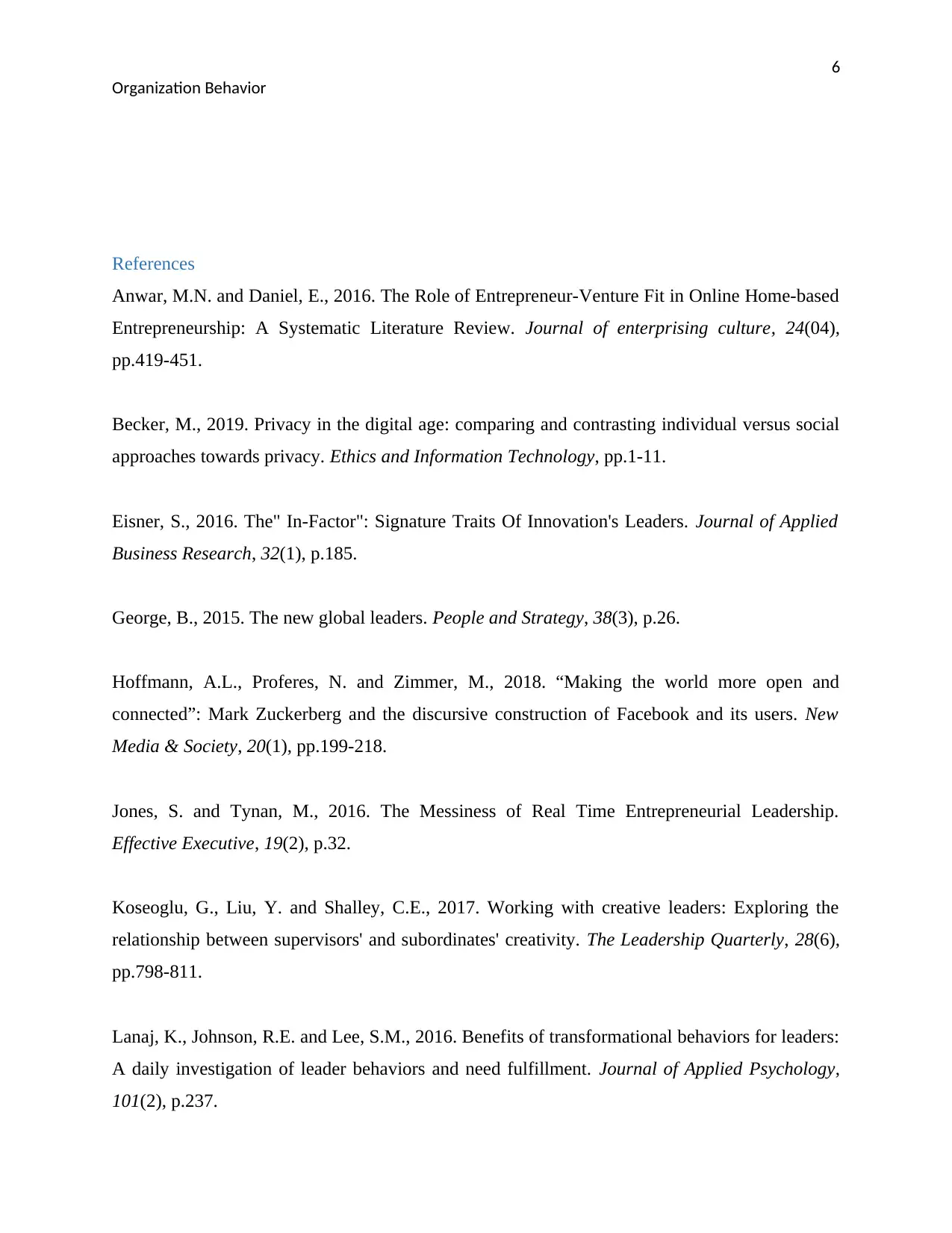
6
Organization Behavior
References
Anwar, M.N. and Daniel, E., 2016. The Role of Entrepreneur-Venture Fit in Online Home-based
Entrepreneurship: A Systematic Literature Review. Journal of enterprising culture, 24(04),
pp.419-451.
Becker, M., 2019. Privacy in the digital age: comparing and contrasting individual versus social
approaches towards privacy. Ethics and Information Technology, pp.1-11.
Eisner, S., 2016. The" In-Factor": Signature Traits Of Innovation's Leaders. Journal of Applied
Business Research, 32(1), p.185.
George, B., 2015. The new global leaders. People and Strategy, 38(3), p.26.
Hoffmann, A.L., Proferes, N. and Zimmer, M., 2018. “Making the world more open and
connected”: Mark Zuckerberg and the discursive construction of Facebook and its users. New
Media & Society, 20(1), pp.199-218.
Jones, S. and Tynan, M., 2016. The Messiness of Real Time Entrepreneurial Leadership.
Effective Executive, 19(2), p.32.
Koseoglu, G., Liu, Y. and Shalley, C.E., 2017. Working with creative leaders: Exploring the
relationship between supervisors' and subordinates' creativity. The Leadership Quarterly, 28(6),
pp.798-811.
Lanaj, K., Johnson, R.E. and Lee, S.M., 2016. Benefits of transformational behaviors for leaders:
A daily investigation of leader behaviors and need fulfillment. Journal of Applied Psychology,
101(2), p.237.
Organization Behavior
References
Anwar, M.N. and Daniel, E., 2016. The Role of Entrepreneur-Venture Fit in Online Home-based
Entrepreneurship: A Systematic Literature Review. Journal of enterprising culture, 24(04),
pp.419-451.
Becker, M., 2019. Privacy in the digital age: comparing and contrasting individual versus social
approaches towards privacy. Ethics and Information Technology, pp.1-11.
Eisner, S., 2016. The" In-Factor": Signature Traits Of Innovation's Leaders. Journal of Applied
Business Research, 32(1), p.185.
George, B., 2015. The new global leaders. People and Strategy, 38(3), p.26.
Hoffmann, A.L., Proferes, N. and Zimmer, M., 2018. “Making the world more open and
connected”: Mark Zuckerberg and the discursive construction of Facebook and its users. New
Media & Society, 20(1), pp.199-218.
Jones, S. and Tynan, M., 2016. The Messiness of Real Time Entrepreneurial Leadership.
Effective Executive, 19(2), p.32.
Koseoglu, G., Liu, Y. and Shalley, C.E., 2017. Working with creative leaders: Exploring the
relationship between supervisors' and subordinates' creativity. The Leadership Quarterly, 28(6),
pp.798-811.
Lanaj, K., Johnson, R.E. and Lee, S.M., 2016. Benefits of transformational behaviors for leaders:
A daily investigation of leader behaviors and need fulfillment. Journal of Applied Psychology,
101(2), p.237.
Paraphrase This Document
Need a fresh take? Get an instant paraphrase of this document with our AI Paraphraser
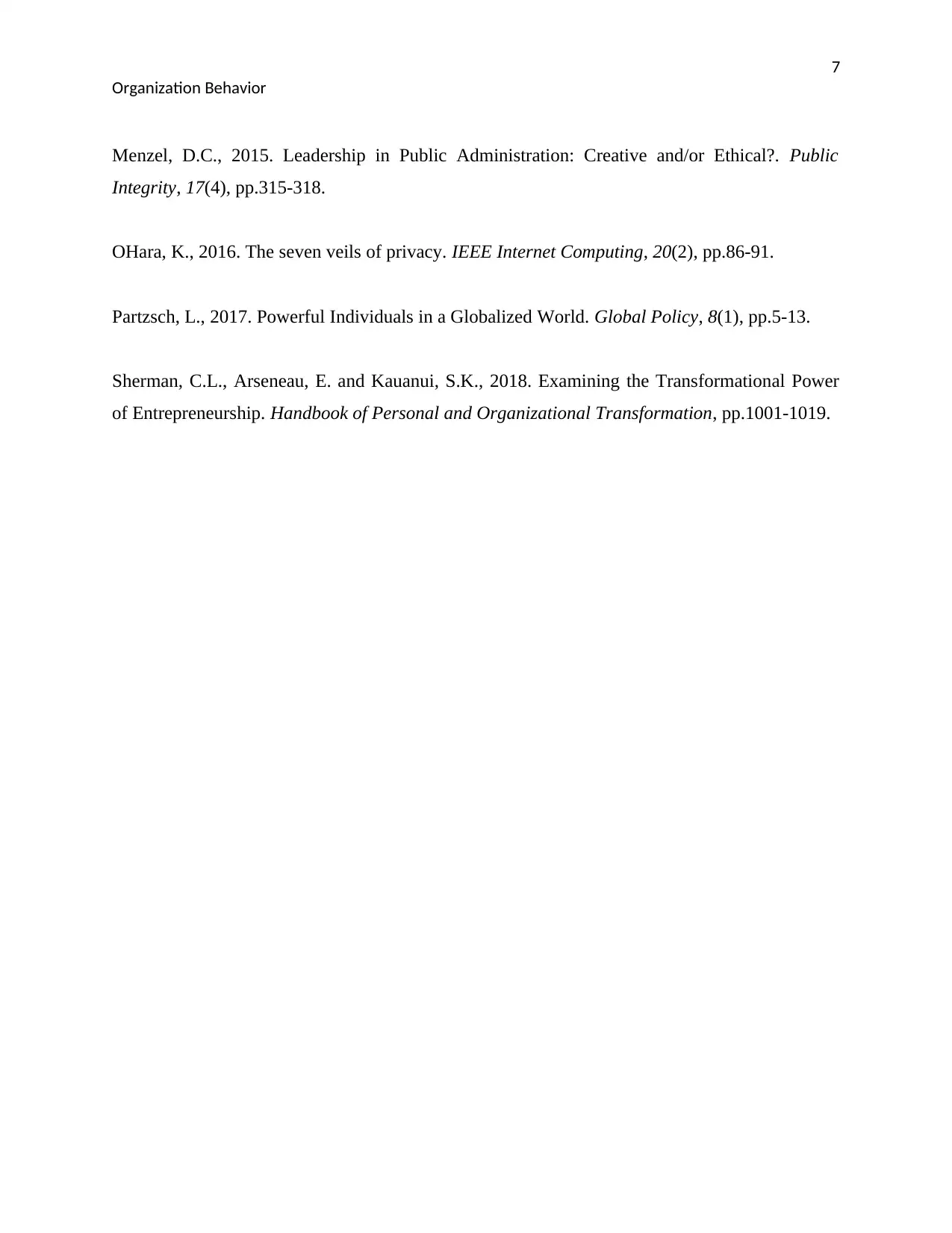
7
Organization Behavior
Menzel, D.C., 2015. Leadership in Public Administration: Creative and/or Ethical?. Public
Integrity, 17(4), pp.315-318.
OHara, K., 2016. The seven veils of privacy. IEEE Internet Computing, 20(2), pp.86-91.
Partzsch, L., 2017. Powerful Individuals in a Globalized World. Global Policy, 8(1), pp.5-13.
Sherman, C.L., Arseneau, E. and Kauanui, S.K., 2018. Examining the Transformational Power
of Entrepreneurship. Handbook of Personal and Organizational Transformation, pp.1001-1019.
Organization Behavior
Menzel, D.C., 2015. Leadership in Public Administration: Creative and/or Ethical?. Public
Integrity, 17(4), pp.315-318.
OHara, K., 2016. The seven veils of privacy. IEEE Internet Computing, 20(2), pp.86-91.
Partzsch, L., 2017. Powerful Individuals in a Globalized World. Global Policy, 8(1), pp.5-13.
Sherman, C.L., Arseneau, E. and Kauanui, S.K., 2018. Examining the Transformational Power
of Entrepreneurship. Handbook of Personal and Organizational Transformation, pp.1001-1019.
1 out of 8
Related Documents
Your All-in-One AI-Powered Toolkit for Academic Success.
+13062052269
info@desklib.com
Available 24*7 on WhatsApp / Email
![[object Object]](/_next/static/media/star-bottom.7253800d.svg)
Unlock your academic potential
Copyright © 2020–2025 A2Z Services. All Rights Reserved. Developed and managed by ZUCOL.




